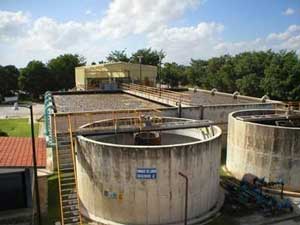Role of water treatment chemical in sludge bulking
Sludge bulking refers to the phenomenon that the sludge structure is very loose, the volume increases and floats, and it is difficult to settle and separate, which affects the quality of effluent. Sludge bulking is very difficult to deal with. The practical operation is not convenient. Therefore, we usually need to use water treatment chemical for one-step treatment. So, what is the role of water treatment chemical in sludge?
1. If it is caused by filamentous bacteria, it can be killed. Such as adding chlorine, ozone, hydrogen peroxide and other water treatment agents.
2. Improve the flocculation of activated sludge. Add flocculant and other water treatment chemicals.
3. Improve and improve the sedimentation and compactness of activated sludge. Add lime, etc.
4. Increase the amount of return sludge and carry out regenerative aeration before its return.
5. Aeration should be strengthened to increase the do value of the mixture.
6. The retention time of sludge in the second sedimentation tank is reduced.
7. Adjust sludge load. When it is more than 0.3KG, filamentous bacteria are easy to swell.
Different types of water treatment chemicals should be added under different treatment requirements of sludge bulking. In the face of this problem, the role of water treatment chemical is still very big, I hope customers can make good use of it in the future.
Introduction of sewage discharge knowledge before using scale inhibitor
Now many industries are committed to the development mode of environmental protection and energy saving, but the rapid economic development will be accompanied by a lot of pollution problems. So now a variety of environmental protection equipment and sewage treatment chemicals are used more and more frequently and widely. Scale inhibitor is one of the most important varieties.
1. Before using the scale inhibitor, the sewage must be discharged in time. The discharge volume is generally controlled at 5-10%;
2. The total time of each shift is 30-60 seconds;
3. The pollutant discharge of scale inhibitor is carried out at low load operation and high water level;
4. For the descaling objects with continuous blowdown, the discharge amount is determined according to the test;
5. Every sewage point has to discharge sewage. It is necessary to discharge more sewage points with more sediment. Pay attention to the times of scale inhibitor blowdown.
The above is the introduction of sewage knowledge before the use of scale inhibitor. Only by doing this work well can we avoid the influence of impurities on the use effect of reagents, which is very important. Generally, it can be divided into natural polymer scale inhibitor and synthetic polymer scale inhibitor according to its polymerization composition. It also needs to be correctly selected before use to meet its high quality application effect.

